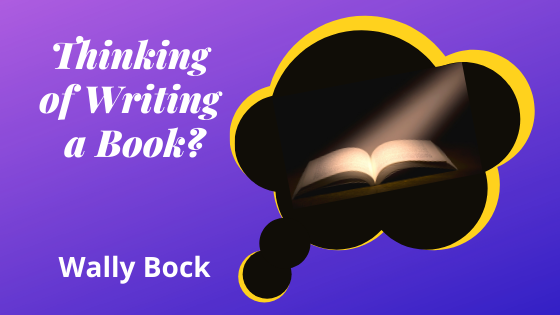 Most people who write a book start with the same thought. “I should write a book someday.”
Most people who write a book start with the same thought. “I should write a book someday.”
That statement isn’t a plan. It’s more like a vague intent. The key word is “someday.” As Sam Horn reminds us, “Someday is not a day of the week.”
For most people who have that thought, that’s all there is. Their book ends right there. If you’re reading this, though, you’ve moved on to the next stage.
You may have thought about “someday” for a week or two or maybe a decade or two. It doesn’t matter. What usually happens next is something triggers more intense effort.
Sometimes a friend or competitor publishes a book and you think that you need to have one for your career. Maybe you read an article about how to put a book together or how much a book can help you. Maybe you read somebody else’s book and thought, “I can do better than that!”
You’re looking for information to help you make a wise decision about whether you want to write a book. You’re already ahead of most folks. You’re also at the point where most of my clients talk to me for the first time. After we chat, their actions fall into one of three groups.
More than half decide they don’t want to do a book at all. They weighed the costs in time and money against the benefits. They decided there were better ways to use their resources.
A second group wants to do a book but doesn’t want to do a book that requires the time and attention that I suggest. Usually, they tell me they, “Just need a book.” They mean they don’t need a really good book, just something with their name on it. There are plenty of people out there willing to help you do that if that’s your choice.
That’s fine with me. I want to work with the third group. Those are people who choose to write a book that they’re proud of and that achieves their objectives. If that’s you, keep reading.
There are three things standing between you and a book that achieves your objectives and makes you proud.
The first thing is that you don’t know what you don’t know. For you, writing a book is like trying to make a go of it in a foreign land where you don’t know either the language or the customs and you don’t have many friends. It’s tough.
You can beat that with a lot of research. You can talk to people like me, read books, and chat with people who’ve done what you want to do. I encourage you to get all the knowledge you can, because every bit will help.
No matter how much you learn, you’ll still be a stranger in a strange land. You’ll need to make decisions about tradeoffs and make choices about your book’s content and appearance that you may not be comfortable making. That’s where it’s good to have an advisor or two to help. It’s like when you’re sick. You don’t know enough to make the medical decisions necessary, but you trust your physician.
The second thing between you and that book you want is that writing a book is hard work. It’s hard work even if you know your material cold. It will take you a year or more to write the book before you send it off to a professional editor. You’ll revise it three or four times. You’ll have to listen to some unsettling feedback.
Writing a good or a great book takes a lot of work. That shouldn’t surprise you. I bet everything significant you’ve accomplished in your life took hard work, too.
There’s one more thing. I bet you already have a calendar that’s jam packed with work and family and other obligations. That means that you need to get the time to write from somewhere that’s important. For many people I work with, this is the single biggest challenge. It’s also the most common reason people abandon a book after they start.
If you’re going to write a book you’re proud of, you need large blocks of time consistently. That’s true even if you use a ghostwriter of some kind. Getting that time when you’re already committed in so many ways is a real challenge.
Writing a great book can be one of your life’s great adventures. In the process, you’ll learn more about your material than you know now. You’ll learn a lot about yourself, too. And you’ll develop habits that will pay off long after the book you’ve finished your book. A great book is the gateway to better recognition, increased fees, and more interesting work.
Bottom Line
Writing a great book can improve your income and your reputation, but it’s hard work. You won’t know all the things you don’t know when you start, so you’ll need some wise advisers to help you. You should plan to put in at least a year of steady work, with multiple revisions and uncomfortable feedback. And you will work out how to fit the intense work of writing a book into your already jam-packed schedule. It’s worth it.
To Find Out More
There are more than 1500 posts on this site about every aspect of writing and publishing your book. You can also download two free white papers.
LinkedIn is the place to discover what my clients say about me.
